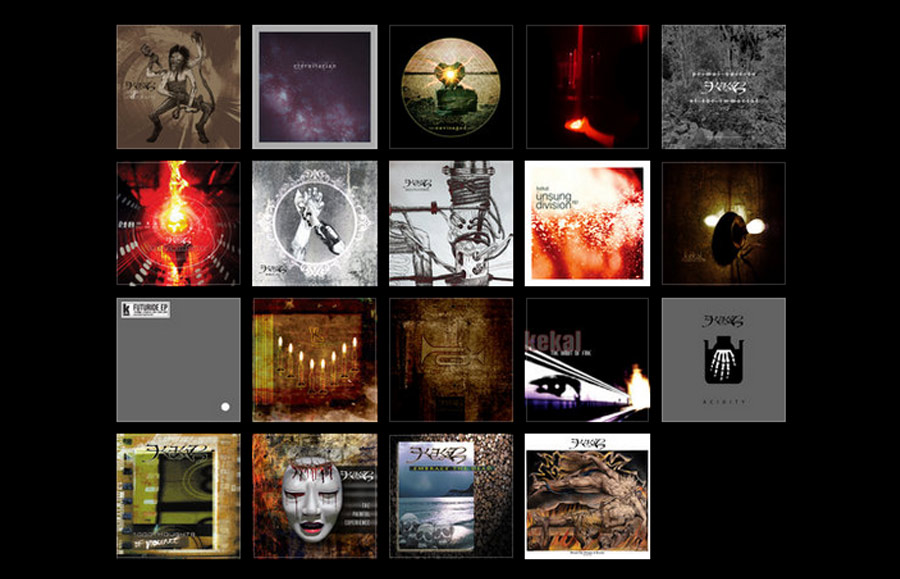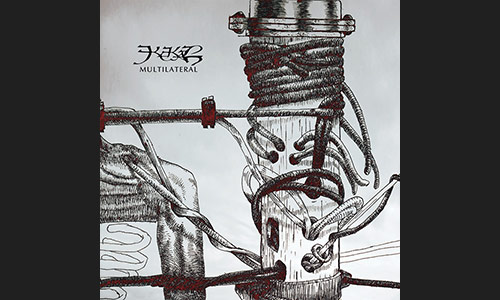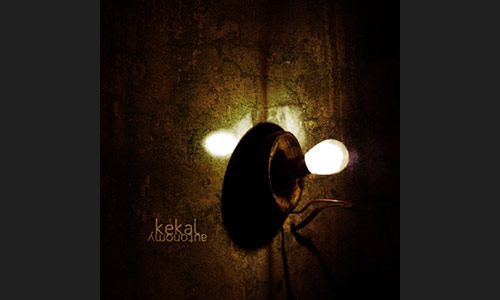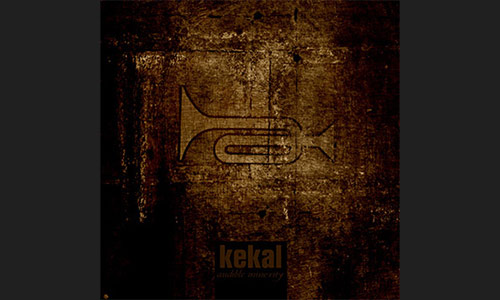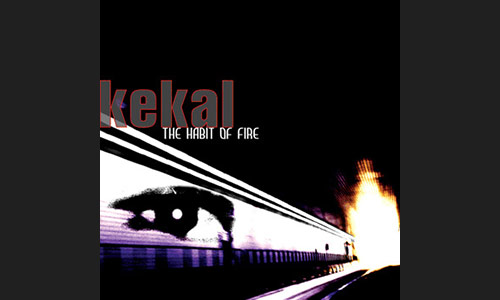8 (2010)
8th full-length studio album
Release Date (Original)
Whirlwind Records, December 2010 (CD, digital)
Release Date (2025 Updated version)
Kekal, May 2025 (Digital)
Track Listing
- Track One
- Gestalt Principles of Matter Perception
- A Linear Passage
- Tabula Rasa
- Private School of Thought
- The Regulars
- Departure Gate 8
- Heartache Memorial
- Let Us Blend
- Open World
- End Unit of The Universe
Total Running Time: 56:26
Album Description
"8", the eight full-length album from Kekal is a collection of thoughts and emotions blended together into a unique yet bold statement. Each song displays its character as a balance between electronic and organic elements, rhythm and melody, aggression and atmosphere, simplicity and complexity, beauty and the beast.
By incorporating both traditional and non-traditional approaches to production and a wide range of musical instruments such as electric & acoustic guitars, drums, samples from field-recordings, theremin, analog synths, vocals, vocoder, TR-808, and even a 'controversial' vuvuzela sample, Kekal redefines the term 'experimental' in its true sense, but yet listeners will find the entire album accessible and digestible.
Kekal may also be the first band in the world who released a new studio album without any official band member. All original members left the band in 2009, but they continue to supply their artistic outputs such as music and artwork for Kekal (albeit not as official members).
Credits
All samplings and field-recordings were done at various places, both public and private, using a portable digital recorder. All vocals, guitars and other 'supposedly organic' musical instruments were performed and recorded by Jeff Arwadi, except "Departure Gate 8" and "Heartache Memorial" by Jeff Arwadi and Leo Setiawan.
Assembled, programmed, contemplated, manipulated, arranged, mixed and mastered by Jeff Arwadi throughout the winter months of 2009 and 2010 at Northern Isolation Station, Calgary - Canada. Produced by Jeff Arwadi.
Artwork and Illustrations by A. Levi Sianturi a.k.a Harshgriev. Digital layout by Soundmind Graphics.
As in 2010, Kekal has no official band members.
Downloading / Purchasing Information
8 Physical CD [Sold-Out]
Buy 8 Digital
Music Video + Audio Streaming
Insights - Excerpt of interview with Jeff and Levi about the album "8" on Asian Rock Rising (Japan)
March 2012
Could you describe the music making process of "8" album?
Jeff: Wow, that is tough.. I've never been successful enough in describing the music making process into concrete sentences, so let me just say in a simple way: The music on "8" was mostly created based on the out-of-the-studio recordings, which I call them 'field-recordings'.. I brought my pocket-sized, battery-operated digital audio recorder during commuting between home and work for about a year long, and record many interesting sounds, then I put those sound files to my hard drive and started to listen to them and carefully selecting the best ones.. From there I started to edit and arrange the sounds on my laptop.. I spent many hours editing and arranging these recordings and made them into something sonically worthy, of course by applying effects and taking out the background noises and everything.. Then I also collected guitar samples from Leo's isolated performances, previously recorded for his demo material that was sent to me earlier in 2009, and use them to build a couple of songs.. Most of the instruments are non-organic, means that I don't use drums and bass at all.. I used guitars, but they were recorded separately and I'd chopped them as loops, so that wasn’t so much a direct performance.. you know.. The whole production was done digitally using a computer and a couple DAW programs, and the editing process took so much time, including virtually re-amping the sounds and beats, distort them, chop them, up to the point I could barely notice the base sound..
Where did the main inspiration for the songs come from?
Jeff: I would say the inspiration to the production or recording techniques is more obvious than for the songs, because they were not 'songs' yet while the elements or sounds were arranged, you know.. They only became the song after whole elements got re-shaped and materialized.. The recording techniques of course are more common with the early 80's industrial music, like Einstürzende Neubauten, stuff like that, and I have been influenced also by early Japanese noise artists, you know, like Merzbow or Incapacitants, with the using of over-the-top distortions and signal feedback.. Then also, lately I've been very interested in the more experimental works of electronic music purists mainly with bands like Autechre and Pan Sonic, and in contrast, also with genius musicians like Amon Tobin or Squarepusher, the way I learned to make some good breaks and chops from the available samples and loops collected.. I believe all of those things have significant influence to how the music on "8" was developed in the first place.. As for the general theme of the album, which includes lyrics of course, most of the inspirations come from urban life, and the alienation and isolation..
KEKAL's new album will be released in this year,right? How would you describe "Autonomy" album compared to "8"? What can we expect of your new album?
Jeff: It is very different.. To me personally, I like "Autonomy" much much better than "8", that’s because "8" was constructed during a period when I was losing interest of playing guitar and writing music in a traditional, expressive way - you know.. That's why I did all those field recordings, to distance myself from getting involved with the first ideas of writing music.. "Autonomy" on the other hand, is a return to a moment where I could transfer my emotions into a guitar playing, and to create music from guitar as a basic instrument that shapes the songs.. Of course, I also have a few of the songs that were created based on synthesizers as opposed to guitars, but all the songs that have vocals came from guitar first, so it is a much more guitar-related album than "8", and it feels much more organic and alive in sound.. Also, the new album has a bigger musical contribution from Leo (the other former member and guitarist) than the last 2 Kekal albums, and he's still comfortable in playing metal-styled guitar, so you may find some of the so-called 'metal' elements here and there, like the tremolo picking, etc. without really calling the album technically as a metal album, you know.. You can expect many surprises.. There are many new things on "Autonomy" that haven't been presented before in any Kekal album..
Levi: Compared to 8, musically Autonomy offers a one song experience. It has almost no boundaries between each track that it makes you omit the track-list and let your self being dragged somewhere. Once you realize this, you won't need the booklet anymore. Picture-wise -- as I usually contribute on this even it's not been printed yet thus changeable -- it can stand alone as a different part of the "album". One thing I wish I could've done was doing my sketches as it was presented on 8. I just cannot find the good energy to start some new drawings. It's sad knowing that the 2-D representative was made on Septmber 2009 and it kinda stop there. Heh..
I guess, Maybe you still like old metal stuffs. But Probably, the music which you have been listening to recently is not a metal music. What kind music do you listening to?
Levi: Lately I've been listening to Suffocation, Nile, Mumford & Sons, The Abbasi Brothers, and Japan's crust band Kriegshog.
Jeff: Well, in the last 5 years or so I've been almost completely away from listening metal and all sorts of aggressive music.. The mood and enthusiasm just aren't there anymore to listen these kinds of music.. Currently, I listen to music just while on the road during commuting between home and work.. My playlist includes the new album from Amon Tobin "ISAM", Radiohead's "The King of Limbs", and the 2 latest EPs from Cynic.. And once in a while I play my ultimate favorites like The Cure’s “Seventeen Seconds” or Miles Davis' "Kind of Blue"...
Everybody said, KEKAL is Avant-Garde. This word is little bit difficult to understand. I think it's repeating an experiment and journey to find a new place. So What kind of value does KEKAL music have for you? and Where do you go from here? What are there any further musical challenges or aspirations?
Levi: When it comes to Kekal, it means a strive to create a new thing. I try my best to present what is new to my self in terms of drawings both technically and conceptually. It may not be new for some, but as long as I'm happy with it..that's fine.
Jeff: Personally, I no longer believe in categorization of music, so that means I no longer believe in music genres as well.. In the past, when Kekal started about 17 years ago, I used to connect myself to genres, because I wanted to extract the energy within the particular styles of music that have become genres or sub-genres.. Right now, I no longer feel an urge to connect to a specific genre in order to extract the energy.. Kekal has maintained its own energy, very strong one, and that is coming from life itself, from the lives of the former members including myself, and from the people we know.. To me, music is part of the human expression and in order to fully express what's in us, we need to free ourselves from the boundaries, including the boundaries of genres and classification of music.. When it comes to the term 'avant-garde', I don't mind at all as long as it's not used to classify bands or musicians that do some sorts of experiments in their own music.. The term 'avant-garde' should reflect what is inside, like a belief-system, an ideal.. If you are looking for something new everyday, or if you believe that change is the only constant in life, naturally, you always find yourself transforming, and you will progress and move forward.. That way, getting to one place from another is just a result of the transformation itself.. I like your take of the term 'avant-garde' as 'a journey to find a new place', I think that's what I am trying to achieve in music and also in life, something new.. Where do I go from here..? I have no idea.. If I already know that I wouldn't call it a journey anymore.. But the keyword is to just keep going.. The main challenge is of course to stay true to yourself, because there are lots of pressure either from peers, from the music scene that somewhat helped the band grow in the beginning, or even from the industry - pressure that tries to deter your own self-expression into conformity.. Being in a specific, genre-based music scene with strong sub-cultural influence, you just have to face these typical challenges, and even more so if you put a career in music.. The good thing is that none of us contributors for Kekal put career or profession in music, so that we never really care about making money from the music at all, and we're now officially out of the band, this means we don’t get a pressure of ‘being in the band’ in the first place..
Get All Kekal Digital Releases
Get the entire Kekal digital album discography (a bundle of 19 Kekal digital releases sold on Bandcamp including 13 full-length albums and 4 EPs) for only $29 USD. That's a 50% off a-la carte price.
A great way to check out the music of Kekal.
